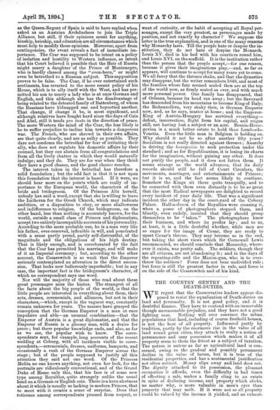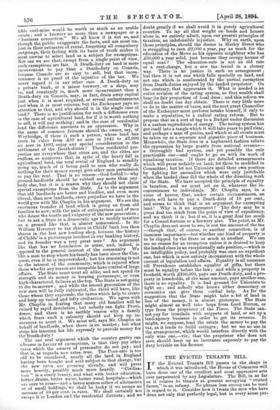THE COUNTRY GENTRY AND THE DE ATH-DUTIES.
WE regret that the Conservative leaders appear dis- posed to resist the equalisation of Death-duties on land and personalty. It is not good policy, and it is doubtful finance. They have to contend with an immovable though unreasonable prejudice, and they have not a good. fighting case. Nothing will ever convince the urban populations that land, including of course freehold houses, is not the best of all property. Influenced partly by tradition, partly by the enormous rise in the value of all land round great cities, they attach to realty a notion of permanence and easy possession which makes it of all property seem to them the fittest as a subject of taxation. The notion is untrue as far as agricultural land is con- cerned, owing to the gradual and possibly permanent decline in the value of farms, but it is true of the residential properties, and has a sentimental justification not often noticed. Money slips away and land does not. The dignity attached to its possession, the pleasant occupation it affords, even the difficulty in bad times of effecting a sale, makes a family cling to an estate in spite of declining income, and property which sticks, no matter why, is more valuable in men's eyes than property that may melt. If it were not so all property could be valued by the income it yielded, and an exhaus- tible coal-mine would be worth as much as an arable estate ; and a brewery no more than a newspaper or a business connection?' We all know it is not so, and though the public exaggerate the facts, and are most un- just in their estimates of rental, forgetting all compulsory outgoings, their feeling with its basis of truth makes it most unwise to select land as a subject for exemptions.
Nor can we see that, except from a single point of view, such exemptions are fair. A Death-duty on land is more inconvenient to pay than a Death-duty on Consols, because Consols are so easy to sell, but that incon- venience is no proof of the injustice of the tax. We never regard it in any other case. A Death-duty on a private bank, or a minor brewery, or a shop, may be, and constantly is, much more inconvenient than a Death-duty on Consols, may, in fact, drain away capital just when it is most required, or reveal embarrassment just when it is most ruinous, but the Exchequer pays no attention to that, and why should it in the single case of land? There is no justification for such a difference even in the case of agricultural land, for if it is worth nothing to sell, it will pay nothing ; and in the case of residential land the difference amounts to an oppression. Why in the name of common fairness should the owner, say, of Weybridge, if there is such a person, whose land has risen in value from £50 an acre in 1843 to £1,000 an acre in 1893, enjoy any special consideration in the settlement of the Death-duties ? These residential pro- perties are everywhere that cities are, and the cities are -endless, so numerous that, in spite of the heavy fall in agricultural land, the total rental of England is steadily going up, much of it being paid to men who really do nothing for their money except give other men permission to pay the rent. That is no reason—God forbid 1—why ground-landlords should be robbed any more than any- body else, but it is a reason why they should not claim special exemptions from the State. As to the argument that old landlords are better and kindlier, and even more liberal, than new landlords, every prejudice we have in the world goes with Mr. Chaplin in his argument. We see the enormous transfer of land which is going on from old families to new, with the pain of antiquarians and of men who detest the bustle and vulgarity of the new generation ; but to ask a State in a democratic age to modify taxation on a ground like that, is almost nonsensical. Is Sir William Harcourt to tax shares in Childs' bank less than shares in the last new lending shop, because the history of Childs' is a picturesque incident in our banking history, and its founder was a very great man ? An argument like that has no foundation in sense, and, indeed, is opposed to the general interest of the community. We like a man to stop where his family has been since the Con- quest, even if he is impoverished ; but his remaining is not to the interest of the community, which is injured when those who for any reason are incapable have control of large affairs. The State must treat all alike, and not spend its strength and its money in keeping picturesque, or even high-charactered, failures at the top. The State is not going to die to-morrow ; and while the second generation of the new men will be fully cultivated, the third will have, like -those whom they supersede, the tastes which help to create and keep up varied and lofty civilisation. We agree with _Mr. Chaplin in fearing that many old families will be ruined by rapid devolution ; but nobody can fight Provi- dence, and there is no earthly reason why a family which fears such a calamity should not keep up in- surances to avert it. We must sell, says Mr. Chaplin on behalf of landlords, when there is no market ; but what stops his insuring his life expressly to provide money for the Death-duty The one real argument which the country gentry can advance in favour of exemptions, is that they pay other taxes which the owners of personalty do not pay ; and that is, as regards new rates, true. The Poor-rate is too old to be considered, nearly all the land in England baying been bought and sold subject to that charge, but the new rates are pressing already, and will press more heavily, possibly much more heavily. "Civilisa- tion " is a costly luxury, and what with better education, better drains, better water, better rural hospitals—which are sure to come—and a better system either of allotments or of small holdings, we shall be lucky if we escape an increase of 50 per cent. in rates. We shall certainly not escape it in London and the residential districts ; and we doubt greatly if we shall avoid it in purely agricultural counties. To lay all that weight on lands and houses alone is, we entirely admit, upon our present principles of taxation, an indefensible injustice. Why on earth, upon those principles, should the doctor in Harley Street who is struggling to earn £2,000 a year, pay as much for the education of the Mews as his opposite neighbour who has £30,000 a year solid, just because they occupy houses of equal rent ? The education-rate is not an old rate or a rent-charge, but a new tax levied in a clumsy way. There is no justice in such an arrangement ; but then it is not one which falls specially on land, and not one which is ameliorated by the partial exemption from Death-duties enjoyed by the landed proprietor. On the contrary, that aggravates it. What is needed is an entire revision of the rating system, so that wealth shall bear its fair proportion of local dues ; and this reform we shall no doubt one day obtain. There is very little more to do in the matter of taxes, and the next great Chancellor of the Exchequer must perforce betake himself, if only to make a reputation, to a radical rating reform. But to propose that as a sort of tag to a Budget under discussion is a useless expenditure of energy. The rating system has got itself into a tangle which it will take years to pull clear, and perhaps a man of genius, and which at all events must be taken up as a separate and gigantic piece of business. Meanwhile, the State does in a haphazard fashion relieve the oppression by large grants from national revenue—. a thoroughly bad system, and yet possibly the only practicable one—and ought to go on with its work of equalising taxation. If there are detailed arrangements which will press unfairly on land, let them be modified in Committee; but let not Unionists spoil their own position by fighting for anomalies which were only justifiable when the landed class did the whole of the directing work of the State. We have accepted the principle of equality in taxation, and we must act on it, whatever the in- conveniences to individuals. Mr. Chaplin says, in a voice of horror, that, under certain circumstances, an estate will have to pay a Death-duty of 18 per cent., and seems to think that is an argument for exempting land! Why is it an argument ? The duty may be a great deal too much from the point of view of expediency, and we think it is ; but if so, it is a great deal too much for a Consol fortune or a brewery also. The point, as Mr. Chaplin does not seem to see, is not the amount of the tax —though that, of course, in another connection, is of immense importance—but whether one kind of property is to be clipped by the State as much as another. We can see no reason for an exemption unless it is desired to keep the landed class in an exceptionally safe position,—which is an intelligible policy, and probably was once an expedient one, but which is now entirely inconsistent with the whole current of legislation and affairs. Equality is all nonsense till Providence establishes equality of gifts, but there must be equality before the law ; and while a property in freehold, worth £100,000, pays one Death-duty, and a pro- perty in leaseholds, of the same amount, pays another one, there is no equality. It is bad ground for Unionists to fight on ; and nobody who knows either democracy or economics can . give them cordial help. As for the suggestion that the State might take a bit of land in lieu of the money, it is almost grotesque. The State might almost as well take hops from Lord Burton, or type from the proprietor of the Times. The State can- not pay for ironclads with snippets of land, or set up a land-agency business in order to get its revenue. It might, we suppose, lend the estate the money to pay the tax, as it lends to build cottages ; but we see no use in the arrangement, which would interfere directly with the only wise one,—viz., that the proprietor who does not save, should keep up au insurance expressly to pay the duty leviable on his decease.



















































 Previous page
Previous page